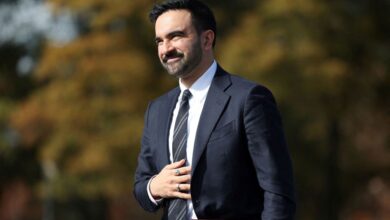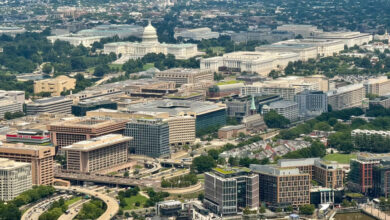“Egyptians will not be fooled into participating in a fake democracy, regardless of the internal and external pressures,” opposition leader Mohamed ElBaradei said, in response to US Secretary of State John Kerry’s call for opposition parties to take part in upcoming parliamentary elections.
Most opposition factions gave the same response to Washington, which they have accused of bias toward the Muslim Brotherhood.
Everything has changed since the revolution, except for one thing: The relationship between the administration, the opposition and Washington. It is a relationship marred by the paradoxes rampant in political life.
The statement given by ElBaradei — which was echoed by the political powers comprising the National Salvation Front, most of which rejected meeting Kerry — does not differ much from what the Brotherhood used to say under the rule of ousted President Hosni Mubarak. It’s as though political players are trading positions.
Some opposition figures have gone so far as to accuse Kerry of being the “Brotherhood’s man in the US.” In an act of one-upmanship, the opposition refused to sit with Kerry. Some of its members even staged protests against his visit in an attempt to pressure Washington to change its approach, which the opposition says is invariably supportive of the Brotherhood.
Under Mubarak, the Brotherhood was equally critical of any visit made by an American official to Egypt.
Much like Mubarak’s regime, President Mohamed Morsy and the Brotherhood’s relationship with Washington is based on maintaining security and stability at the expense of democracy. Security, in this regard, is a loose concept that encompasses wide-scale control and even forcible imposition of stability, as well as the security of Israel and the protection of US interests in the region.
But regardless of that abrupt change in the Brotherhood’s position, which previously regarded the US as the “devil” — for everyone was aware of how this issue was exploited to serve ideological goals or elicit sympathy to either rally support or embarrass the Mubarak regime — what is genuinely remarkable about it is this sudden harmony, even congruency, in the visions of Morsy, the Brotherhood and the US.
This transformation is flagrant in the sense that it was not preceded by any ideological socialization to internalize this new relationship with the US.
One good example of this shift was when the Brotherhood turned a blind eye on US pressure on the opposition to participate in the parliamentary elections and its offer to be the “mediator” between both sides.
Ironically, such a mediatory role would have not been possible under Mubarak, who was described as Washington’s “strongest ally in the region.”
If anything, this demonstrates the fragility of the ruling regime and its failure to solve the political standoff with the opposition.
Morsy and the Brotherhood are trying to persuade Washington that they are capable of managing the country in its current situation. In making this claim, they are, on the one hand, banking on the weakness and fragmentation of the opposition and, on the other, trying to portray themselves as a guarantor of keeping Islamist extremism in check.
They replicate the same approach that was used by Mubarak against them and enabled him to maintain power for three decades. The Brotherhood is aware that Washington will not trust an opposition that cannot mobilize the street against Islamist extremists or defeat them in elections.
It is also unlikely that Washington would, at least in the short term, run the risk of antagonizing the regime in Egypt, whatever its affiliations, for the sake of a weak opposition incapable of rallying its supporters to overthrow the current administration.
Meanwhile, Washington seems genuinely confused. Since the Brotherhood took power, it has failed to shape a clear policy or strategy toward the new government in Egypt, even though it has been keen on getting across a positive message that it will not interfere with the will of Egyptians, as President Barack Obama recently said.
Moreover, policymakers and think-tank circles in Washington are still at a loss in searching for new options on how to deal with the Brotherhood. Obama’s administration seems torn between options.
It does not want to risk antagonizing the Brotherhood or pressuring them too much, so long as Morsy continues to play Mubarak’s role in maintaining Israel’s security, keeping regional stability and fighting extremism, etc. In fact, it also bears in mind what happened in Iran some three decades ago when it lost its chief ally in the Gulf in the late 1970s. It definitely does not want that repeated.
But Washington is also trying to keep its strategic alliance with Egypt, particularly with regard to armament, intelligence, logistical cooperation and military support. That is why Washington is keen on bolstering its ties with the military institution in Egypt.
And yet, Washington seems to be torn between ties with Egypt and its vital interests in the Gulf. There’s even talk about the US mediating between Morsy’s regime and Gulf capitals, which have been wary of the rise of the Brotherhood in Egypt.
To complicate matters further, the Obama administration is under pressure from the US Congress, with some members condemning US ties with Morsy’s regime, which they consider an enemy of the US and Israel. In addition, media and civil society organizations are also piling pressure on Obama with regard to issues of democracy, protection of minorities and humans rights.
Washington is walking a fine line to preserve these conflicting interests, all the while realizing that sacrificing Egypt as a strategic ally is out of the question, not only because of the cost, but also because it is not the proper time to radically review relationships. Washington is counting on being able to provide economic and financial support to bolster the Egyptian economy, and on the ability of the Egyptian military to intervene if internal conditions deteriorate and Morsy’s regime loses control like Mubarak’s.
In other words, Washington is dealing with Morsy as a bitter medication that will either treat the patient or push him to take another pill that may be even more bitter and less effective.
Discussions of the relationship between the regime, the opposition and Washington disregard one important determining factor — the revolution, known as the Egyptian street.
All three parties make logical calculations, disregarding what the street could do to spoil their careful calculations. Morsy’s regime pays no heed to democratic transformation and has not taken any genuine steps in this regard, while the adolescent opposition is too lazy to contest the Brotherhood at the popular, electoral and organizational levels. Meanwhile, Washington is happy with that state of contention, which allows it to pressure both sides to its favor.
Khalil al-Anani is a scholar of Middle East Politics at the School of Government and International Affairs at Durham University, and a former visiting fellow at the Brookings Institute in Washington, DC.




